Assignment: Eternity Read online
Page 8
Seven blinked, caught off guard momentarily by the sizzling flash of the force field. Kirk felt encouraged by Seven’s surprise, but his hopes were dashed by the prisoner’s next words. “I understand you, Captain,” Seven replied, swiftly regaining his customary composure, “but I do not believe you. You are not a barbarian, Captain. You are not even a relatively undeveloped human of the twentieth century. I cannot accept that a Starfleet officer of this era would carry out a threat of that nature, especially against someone such as myself, who has previously demonstrated his good intentions where the future is concerned.”
“Maybe you don’t know me as well as you think,” Kirk insisted, but with less vehemence. Damnit, he’s called my bluff. He remembered Spock’s long list of Seven’s accomplishments in the twentieth century. How harshly can I really treat him? Earth may not have survived without him.
“I’ve dealt with cold-blooded killers before,” Seven said. “Assassins. Executioners. You’re not one of them.”
And thank God for that, Kirk thought. Even if it meant that there were limits to his powers of coercion, limits that Seven seemed all too aware of. Too bad this wasn’t a first-contact scenario. It’s always easier to bluff an alien than a member of your own species.
And if Seven refused to clean up his own mess, then Kirk would have to do it for him. “All right,” he said to Seven. “I don’t have time to argue with you anymore. If you change your mind about helping us, tell one of the guards. In the meantime, I’m going to do my best to keep all of us out of a Romulan prison camp.”
“Good luck, Captain,” Seven replied. “I mean that.”
I’ll bet you do, Kirk thought, turning his back on the prisoner. He was only a few steps away from the exit when a whistle from the ship’s intercom attracted his attention. He approached a speaker mounted in the adjacent wall and pressed the activation button. “Kirk here. What is it?”
Spock’s voice emerged from the speaker. “I apologize for disturbing you, Captain, but our long-range sensors have detected a highly unusual phenomenon. You might want to return to the bridge.”
On his bench, Seven looked up at Kirk the moment Spock mentioned locating something odd. He seemed particularly interested in Spock’s discovery, his entire body seemingly going on alert. Noting Seven’s reaction, Kirk wondered if they were getting closer to the temporal threat Seven kept talking about. “What about the Romulans?” he asked Spock.
“Gladiator remains in pursuit at warp factor 5.88. I estimate that we are about twenty-five-point-six minutes ahead of her at present.”
“Any sign of more Romulan ships?” Kirk asked.
“Negative,” Spock replied. “The sector we are now crossing appears uninhabited. Indeed, on first inspection, it appears quite desolate and unremarkable.”
“Aside from your intriguing phenomenon, that is,” Kirk said, relieved to hear that the Enterprise continued to evade her pursuers, at least so far. He had no idea what kind of oddity Spock had discovered, but he knew his first officer would not have mentioned it unless he thought it was important. “I’ll be right with you,” he said. “Captain out.”
He walked once more toward the exit, then turned around in the doorway to look back at Gary Seven in his cell. “I don’t suppose you have anything you’d like to add to Spock’s report?” Seven stayed as silent as the Sphinx. “I didn’t think so,” Kirk said.
* * *
Kirk was surprised to find both Scotty and McCoy standing by Spock’s science center on the bridge. Scotty’s presence was particularly unexpected. Kirk would have guessed that the engineer would have been hard at work undoing whatever damage was done by Gladiator’s disruptors. Usually, wild horses couldn’t drag Scotty away from his beloved engines, especially when there were repairs to be made.
“I suggested that Mr. Scott join us,” Spock explained as he turned over the captain’s chair to Kirk. “I have reason to believe that the phenomenon I mentioned may be technological in origin, so Mr. Scott may be able to provide some insights into this enigma.” Spock’s gaze shifted toward the two other men. “Dr. McCoy invited himself,” he added dryly.
“I figured Chapel could hold down the fort in sickbay,” McCoy said, “while I found out what sort of fix we were in this time. We came through that last fracas without any serious casualties, but I’m not sure how much longer our luck can hold out.”
Kirk was relieved to hear that his crew was still intact, but eager to find out whatever Spock had discovered. “What sort of enigma?” Kirk asked his first officer, glancing at the main viewer. The screen revealed nothing exceptional, only a routine—if unfamiliar—starfield. Romulan space looked no different from any other void explored by the Enterprise. Makes you realize, he thought, just how artificial all our borders and claims to territory really are.
Spock returned to his science station. “I was scanning for wormholes, in hopes of reversing the circumstances that brought us to this region, when I noted some puzzling gravitational readings in this sector. The discrepancies were quite subtle; if I had not been specifically searching for gravimetric distortions, I doubt if I would have detected them.”
Spock pressed an illuminated yellow button on his science console and the starscape on the main viewer was replaced by a two-dimensional diagram of a solar system. Colored spheres indicated suns, moons, and planets, while elliptical lines charted their respective orbits. Kirk peered at the diagram, trying and failing to uncover its significance. He didn’t recognize this particular solar system, but there didn’t appear to be anything remarkable about it.
“This system,” Spock stated, “lies directly before us, approximately thirty-three-point-five-six minutes away at our current speed. Direct observation indicates the presence of a single class-L sun surrounded by six planets, none of them habitable by life as we know it. Precise gravitational readings, however, suggest the existence of a seventh planet, undetectable by most conventional scanning techniques.”
Scotty’s eyes widened in disbelief. “Mr. Spock, you cannot be saying what I think you’re saying.”
“Indeed I am, Mr. Scott,” Spock replied. “The only logical conclusion is that an entire planet has been concealed by means of a cloaking device of almost unimaginable power.”
“Good Lord!” McCoy exclaimed.
Scotty shook his head vehemently. “It’s impossible to hide a planet!”
A sudden memory flashed through Kirk’s mind. “You said the same thing,” he reminded Scotty, “when our friend, Mr. Seven, claimed to be able to do just that.” According to Seven, Kirk recalled, his alien sponsors had used their unearthly technology to elude discovery even in Kirk’s own time. Could it be, he wondered, that Seven’s superiors’ home base resided in the middle of the Romulan Empire? That seemed unlikely, but he couldn’t dismiss the possibility. Then again, it was the Romulans who had originally developed the cloaking technology now used by both them and the Klingons. Maybe this was some sort of top secret Romulan project?
“That thought had occurred to me as well,” Spock commented, referring to Kirk’s memories of their first encounter with Seven. “It is perhaps significant that the planet’s presumed location is exactly where one would expect to find a class-M planet in a solar system of this nature.”
“I find that very significant, Mr. Spock.” Kirk stared at the diagram on the screen; an empty circle now indicated the probable location of the seventh planet, according to Spock’s calculations. Kirk didn’t even want to think about how much power would be required to cloak a whole planet, but he couldn’t help wondering what sort of secret the Romulans—or Seven’s people—could have gone to so much effort to hide. If the Romulans were responsible for the cloaked planet, it was possible that whatever they were concealing might constitute a serious threat to the safety of the Federation. Since we’re stuck here anyway, he thought, it might not be a bad idea to check this out.
He brooded for only a minute before making his decision. “Mr. Sulu,” he instructed th
e helmsman, “set a course for this mystery planet. Mr. Spock can give you the coordinates.”
“What?” McCoy blurted. He hurried across the bridge from the science station to Kirk’s side. “Jim, you can’t be serious!”
“What’s the matter, Bones?” Kirk asked, although he was none too surprised by the doctor’s reaction. “Aren’t you at all curious about what’s lurking behind that cloaking field?”
“Curiosity killed the cat,” McCoy drawled, “and I’m not just talking about that fuzzy feline Seven brought aboard. Don’t you think we’ve got enough problems without sticking our noses in where we’re obviously not wanted?”
“That’s exactly why I want to investigate,” Kirk said, a determined expression on his face. “We didn’t ask to be here, but now that we are I’m not about to turn my back on what might be some new Romulan super-weapon.”
“You don’t know that for sure,” McCoy objected.
“No I don’t,” Kirk said. “I don’t even know if it’s the Romulans or Gary Seven who are responsible for this enigma, as Spock calls it. But someone’s obviously gone to a whole lot of trouble to keep us from finding out, and that’s what worries me.”
“And what about those poor settlers on Duwamish?” McCoy’s concern was written all over his face. “Never mind the danger to the crew; we’re needed desperately on Duwamish. Those people are in trouble now. We don’t have time to mess about with sneaky Romulan mysteries.”
Kirk winced inwardly. He had not forgotten about the imperiled men and women he had been sent to protect.
Spock came to his rescue. “Regrettably, Doctor, time for us has already run out. Even at maximum warp, the Duwamish system is now many days away. We could not hope to arrive in time to make a significant difference. Logically, our needs and priorities have changed.” Spock pressed a button and the diagram on the main viewer was replaced by a deceptively empty-looking starscape.
“Logic!” McCoy’s face looked as though he had just bitten into an unusually sour lemon. “How can you talk about logic when we’re looking at a catastrophe?”
“Extreme circumstances are often when clear thinking is most required,” Spock responded.
Kirk decided to interrupt the familiar argument between Spock and McCoy. “Starfleet has other ships,” he announced. “They may not be as near to Duwamish as we once were, but they’ll have to do what they can. Spock is right; thanks to our friend Mr. Seven, we’ve lost our chance to be the first on the scene.” Kirk peered at the image on the screen; he could see the system’s sun shining in the distance, but none of its planets were visible yet. He stared into the approaching darkness as if he could penetrate its mysteries by sheer will alone. Somewhere ahead, he knew, was that invisible seventh planet, and who knows what else. This is the right thing to do, he thought. So why do I feel like I’m playing into Seven’s hand?
Chapter Seven
I THINK I’m starting to get the hang of this, Roberta thought. She perched on the edge of the plastic chair, munching on a slice of pizza while she experimented with the computer. At first, the so-called “food synthesizer” had professed its ignorance of even the simplest varieties of pizza, but, after a bit of trial and error, she had not only managed to reprogram the synthesizer to produce passable slices of pizza, but she had also succeeded in teaching it to provide a wide assortment of toppings. Yum, she thought, biting into the sweet and crispy result of her labors. You just can’t get a decent pineapple pizza east of the Mississippi—except on starships, I guess.
The floor was littered with earlier, failed attempts at pizza, some of them topped with alien substances that Roberta couldn’t even begin to identify, especially that wiggly orange stuff that appeared to be, well, alive. Interplanetary brotherhood was all very well and good, but Roberta wasn’t sure she wanted to meet any being that considered that orange goo a condiment. Extending a bare foot warily, she shoved the writhing slice further away from her. “I’ll make you a deal,” she said to the pizza. “I won’t eat you if you won’t eat me.”
The slice, thankfully, left her toes alone.
Enough fooling around, she thought. Time to get down to business. The green cube rested atop the triangular computer terminal, flashing periodically. Establishing a link between the cube and the computer had been easier than she expected, at least once the ship stopped shaking; she wondered just how similar the Enterprise’s computer was to Seven’s good old Beta-5.
Despite her initial fears, she was now convinced that the tremendous jolts that had rocked the Enterprise had not been caused by her first experiments with the computer. The ship must have run into some sort of turbulence, she guessed, remembering that one time she’d had to fly a 747 through a thunderstorm after accidentally knocking out both pilots with a tranquilizer beam. Boy, had that been a bumpy flight! If I can survive that trip, I can survive this one, she thought, although she couldn’t help wondering exactly what sort of rough weather you could run into in space?
“Computer,” she said, focussing on the tiny view-screen, “identify location of the jail . . . I mean, brig.”
“The brig is located on Deck Seven,” the terminal answered. Yes, Roberta decided upon hearing it again, the voice of the Enterprise’s computer was definitely warmer and less snooty than the Beta-5’s.
“Deck Seven, right,” Roberta muttered. Like she knew where that was. She took another tack. “Show me what it looks like.”
The terminal emitted a stern beep. “Access to security monitors is limited to command personnel.”
“Darn,” Roberta said. It made sense, though. Captain Kirk wouldn’t want to give any old visitor the run of the ship. Hopefully, though, she had resources nobody had counted on.
She gave the blinking green cube a friendly tap. “Okay, buddy, it’s your turn. Override the ship’s computer.”
The flashing emerald light within the cube turned into a continuous green glow as the cube went to work. Roberta held her breath while a furious humming emerged from the interior of the three-sided terminal. “Unauthorized interface,” the computer announced, its voice sounding almost alarmed. “Unauthorized interface, unauthor—interface, un—interface, interface, interfacing . . .”
The lighted viewscreen went blank for a moment, then came on again. Roberta gasped as she saw what appeared to be a row of doorless cells, observed from the vantage point of what she guessed was an overhead camera. A string of white lights outlined the entrances to each cell, all of which appeared to be unoccupied except for one in the middle, which held the unmistakable figure of Gary Seven, still clad in his stolen gold and black uniform. Seated on a simple, utilitarian bench, he glanced up at the ceiling outside his cell. Roberta had the eerie feeling that he was looking directly at her.
“Security protocols overridden,” the terminal announced, its previous voice replaced by the cold, imperious tones of the Beta-5.
“Groovy,” Roberta said, staring into the cryptic depths of Seven’s icy blue eyes. She swallowed one last gulp of pizza, then absentmindedly wiped her greasy fingers on her skirt while she tried to figure out what to do next. She licked her lips; the tangy pizza had left her feeling thirsty. “Get me a Fresca,” she said, “with ice.”
“Please supply the chemical components of this foodstuff,” the computer replied.
* * *
“Almost there,” Sulu declared a bit hesitantly. He peered through a binocular viewing mechanism attached to the helm console by a telescoping metal arm. “I think.”
Kirk shared the helmsman’s uncertainty. According to Spock’s calculations, they should be within sight of the seventh planet, yet the screen before him displayed nothing but empty space. “Mr. Spock?” he inquired, rapping his fingers impatiently upon the armrest of his chair.
“The planet should be dangerously close by,” the Vulcan confirmed. “I recommend slowing to impulse speed.”
“Do it,” Kirk ordered Sulu. He squinted at the main viewer as the distant stars appeared to slow to a stop
. “I don’t see anything ahead, Spock.”
Spock approached Kirk’s chair. “According to most conventional scanning techniques, there is nothing there. Nevertheless, slight aberrations in the orbits of the other planets in this system imply the presence of a celestial body at these coordinates.”
“That’s incredible,” Kirk murmured, genuinely amazed by the concept. Cloaked ships were one thing, but an entire planet? “How far out do you think the cloaking field extends?”
“Beyond the outer atmosphere of the planet at the very least,” Spock surmised. “Otherwise we would be able to see a thin, gaseous shell around the location of the planet.”
“I still cannot believe it,” Scotty said, scratching his head. The engineer had remained on the bridge, manning an auxiliary station behind Kirk’s left shoulder. “The energy demands alone are inconceivable. Where do you find that kind of power?”
“I don’t think I want to know,” McCoy said, holding on tightly to the handrail surrounding the command module. “The sooner we get out of here, the better.”
“All in good time, Doctor,” Kirk said. He leaned forward in his chair. “Mr. Sulu, take us closer . . . carefully.”
“Aye, sir,” Sulu said with a nod. He kept his gaze glued to the screen in front of him, as did everyone else on the bridge. You could hear a pin drop, Kirk thought. He hoped that the invisible planet didn’t have any equally invisible moons that Spock had somehow overlooked, or they could be in for an extremely unpleasant collision.
“I don’t suppose,” he said, turning his head towards Lieutenant Uhura, “that anybody on this hypothetical planet is trying to get in touch with us yet?”
“Negative, sir,” Uhura reported. “No hails at all.”
Figures, Kirk thought. He wondered if the inhabitants of the planet, assuming any existed, had detected the Enterprise’s approach. We’ll find out soon enough, he decided. He wasn’t expecting a friendly reception, not this deep into Romulan space. “Go to yellow alert,” he announced.

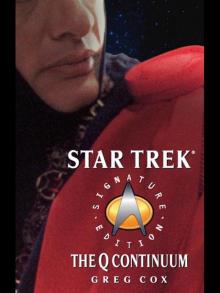 Q-Space
Q-Space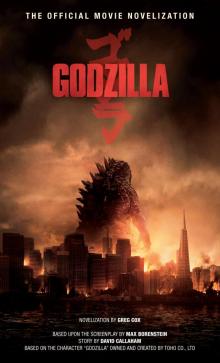 Godzilla - the Official Movie Novelization
Godzilla - the Official Movie Novelization War for the Planet of the Apes: Official Movie Novelization
War for the Planet of the Apes: Official Movie Novelization Underworld: Evolution
Underworld: Evolution Underworld
Underworld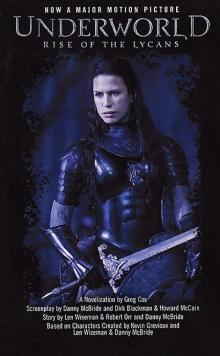 Rise of the Lycans
Rise of the Lycans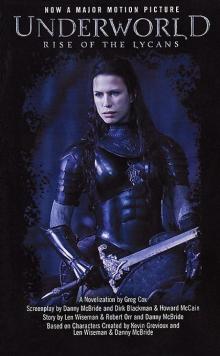 04 - Rise of the Lycans
04 - Rise of the Lycans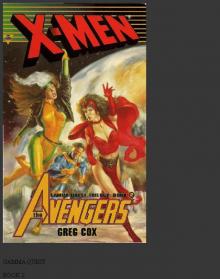 X-Men and the Avengers: Search and Rescue
X-Men and the Avengers: Search and Rescue Child of Two Worlds
Child of Two Worlds Welcome to Promise City
Welcome to Promise City The Librarians and the Mother Goose Chase
The Librarians and the Mother Goose Chase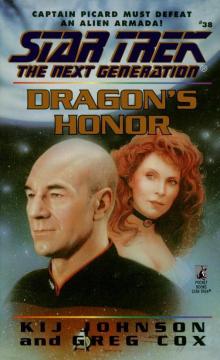 Dragon's Honor
Dragon's Honor 03 - Evolution
03 - Evolution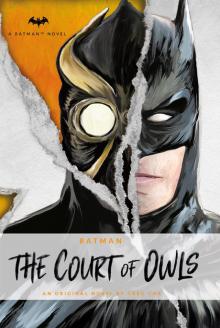 DC Comics novels--Batman
DC Comics novels--Batman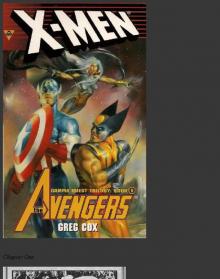 X-Men and the Avengers: Lost and Found
X-Men and the Avengers: Lost and Found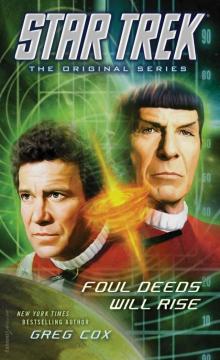 Foul Deeds Will Rise
Foul Deeds Will Rise 02 - Blood Enemy
02 - Blood Enemy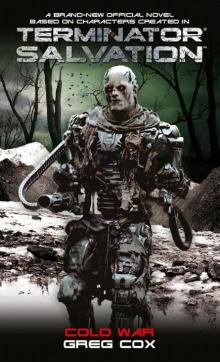 Terminator Salvation: Cold War
Terminator Salvation: Cold War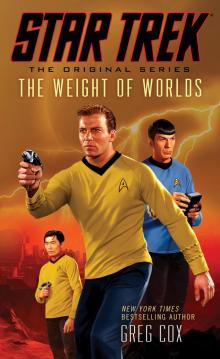 The Weight of Worlds
The Weight of Worlds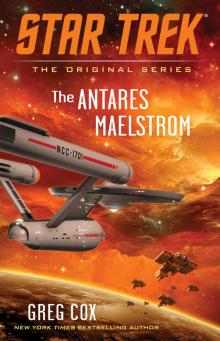 The Antares Maelstrom
The Antares Maelstrom Warehouse 13: A Touch of Fever
Warehouse 13: A Touch of Fever Underworld: Blood Enemy
Underworld: Blood Enemy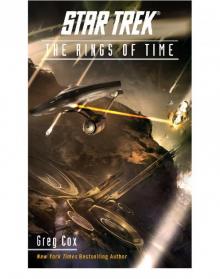 The Rise and Fall of Khan Noonien Singh
The Rise and Fall of Khan Noonien Singh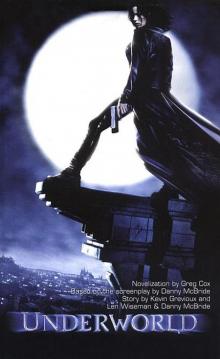 01 - Underworld
01 - Underworld The 4400- the Vesuvius Prophecy
The 4400- the Vesuvius Prophecy Assignment: Eternity
Assignment: Eternity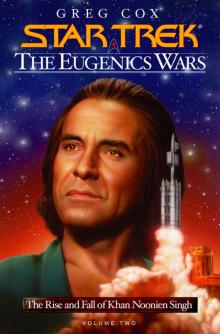 The Eugenics Wars, Vol. 2: The Rise and Fall of Khan Noonien Singh
The Eugenics Wars, Vol. 2: The Rise and Fall of Khan Noonien Singh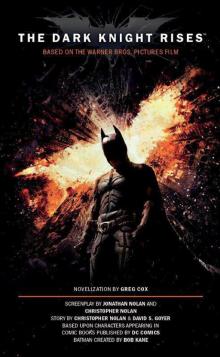 The Dark Knight Rises: The Official Novelization
The Dark Knight Rises: The Official Novelization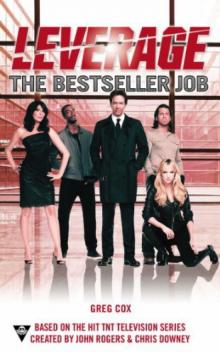 The Bestseller Job
The Bestseller Job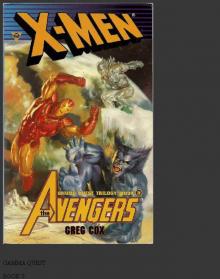 X-Men and the Avengers: Friend or Foe?
X-Men and the Avengers: Friend or Foe?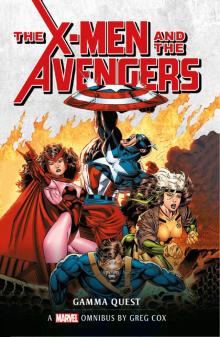 Marvel Classic Novels--X-Men and the Avengers
Marvel Classic Novels--X-Men and the Avengers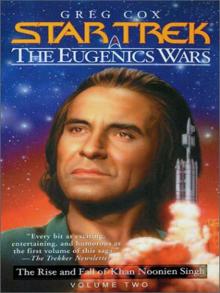 STAR TREK: TOS - The Eugenics Wars, Volume Two
STAR TREK: TOS - The Eugenics Wars, Volume Two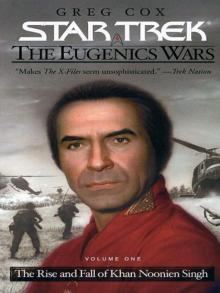 STAR TREK: TOS - The Eugenics Wars, Volume One
STAR TREK: TOS - The Eugenics Wars, Volume One The Black Shore
The Black Shore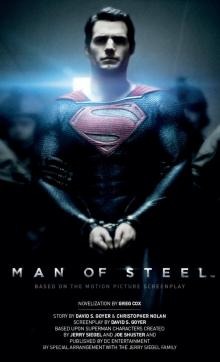 Man of Steel: The Official Movie Novelization
Man of Steel: The Official Movie Novelization Loose ends r-1
Loose ends r-1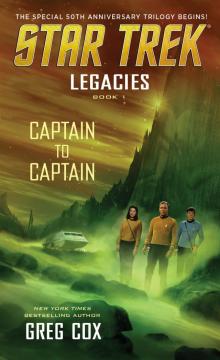 Legacies
Legacies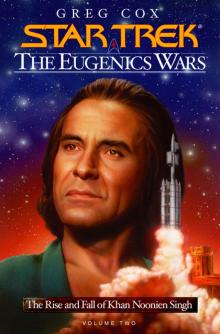 The Eugenics Wars, Volume Two
The Eugenics Wars, Volume Two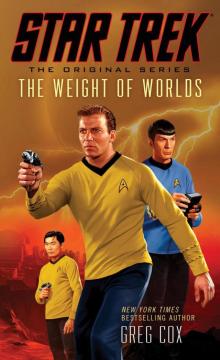 Star Trek: The Original Series - 148 - The Weight of Worlds
Star Trek: The Original Series - 148 - The Weight of Worlds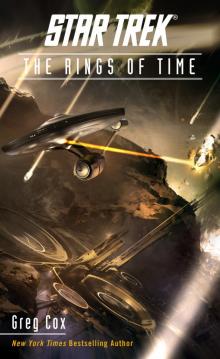 Star Trek: The Original Series: The Rings of Time
Star Trek: The Original Series: The Rings of Time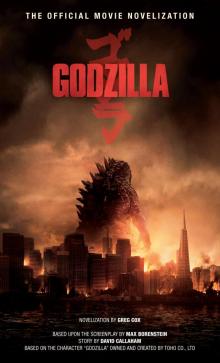 Godzilla--The Official Movie Novelization
Godzilla--The Official Movie Novelization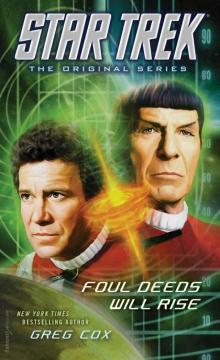 Star Trek: The Original Series - 160 - Foul Deeds Will Rise
Star Trek: The Original Series - 160 - Foul Deeds Will Rise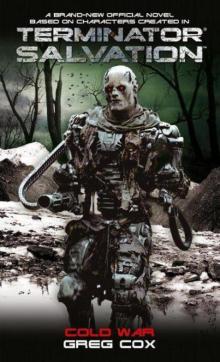 Terminator Salvation: Cold War ts-3
Terminator Salvation: Cold War ts-3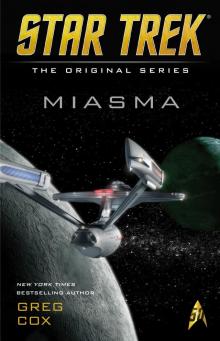 Star Trek: The Original Series: Miasma
Star Trek: The Original Series: Miasma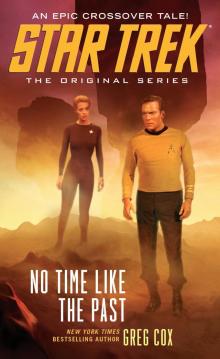 Star Trek: The Original Series: No Time Like the Past
Star Trek: The Original Series: No Time Like the Past Child of Two Worlds (Star Trek: The Original Series)
Child of Two Worlds (Star Trek: The Original Series) THE 4400® WELCOME TO PROMISE CITY
THE 4400® WELCOME TO PROMISE CITY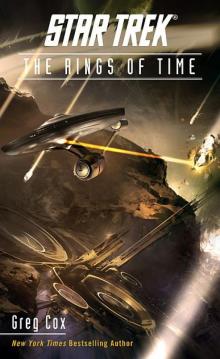 Star Trek: The Original Series: The Rings of Time (star trek: the original series)
Star Trek: The Original Series: The Rings of Time (star trek: the original series) To Reign in Hell: The Exile of Khan Noonien Singh
To Reign in Hell: The Exile of Khan Noonien Singh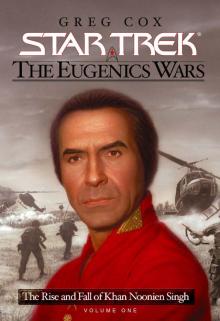 Star Trek: The Eugenics War, Vol. 1
Star Trek: The Eugenics War, Vol. 1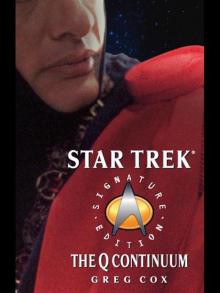 The Q Continuum
The Q Continuum